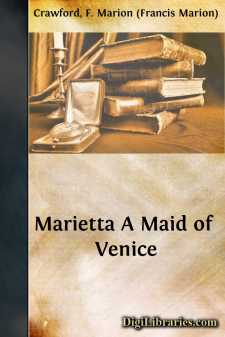Categories
- Antiques & Collectibles 13
- Architecture 36
- Art 48
- Bibles 22
- Biography & Autobiography 815
- Body, Mind & Spirit 144
- Business & Economics 28
- Children's Books 18
- Children's Fiction 14
- Computers 4
- Cooking 94
- Crafts & Hobbies 4
- Drama 346
- Education 58
- Family & Relationships 59
- Fiction 11833
- Games 19
- Gardening 17
- Health & Fitness 34
- History 1378
- House & Home 1
- Humor 147
- Juvenile Fiction 1873
- Juvenile Nonfiction 202
- Language Arts & Disciplines 89
- Law 16
- Literary Collections 686
- Literary Criticism 179
- Mathematics 13
- Medical 41
- Music 40
- Nature 179
- Non-Classifiable 1768
- Performing Arts 7
- Periodicals 1453
- Philosophy 65
- Photography 2
- Poetry 896
- Political Science 203
- Psychology 44
- Reference 154
- Religion 515
- Science 126
- Self-Help 85
- Social Science 82
- Sports & Recreation 34
- Study Aids 3
- Technology & Engineering 59
- Transportation 23
- Travel 463
- True Crime 29
F. Marion (Francis Marion) Crawford
Francis Marion Crawford (1854-1909) was an American writer noted for his prolific output of novels and short stories, many of which explore supernatural themes. His most famous works include the "Saracinesca" series and the horror story "The Screaming Skull." Crawford's rich, descriptive prose and ability to evoke atmospheric settings have earned him a lasting place in the Gothic and supernatural literary traditions.
Author's Books:
Sort by:
Chapter VII. “Has anything gone wrong?” There was so much of interest and sympathy in her tone, as Joe put the simple question, that John turned and looked into her face. The magic of moonlight softens the hardest features, makes interest look like friendship, and friendship like love; but it can harden too at times, and make a human face look like carved stone. “No, there is nothing wrong,”...
more...
CHAPTER I When the accident happened, Cordova was singing the mad scene in Lucia for the last time in that season, and she had never sung it better. The Bride of Lammermoor is the greatest love-story ever written, and it was nothing short of desecration to make a libretto of it; but so far as the last act is concerned the opera certainly conveys the impression that the heroine is a raving lunatic. Only...
more...
PAUL PATOFF. My dear lady—my dear friend—you have asked me to tell you a story, and I am going to try, because there is not anything I would not try if you asked it of me. I do not yet know what it will be about, but it is impossible that I should disappoint you; and if the proverb says, "Needs must when the devil drives," I can mend the proverb into a show of grace, and say, The most...
more...
CHAPTER I "The whole of this modern fabric of existence is a living lie!" cried Marzio Pandolfi, striking his little hammer upon the heavy table with an impatient rap. Then he dropped it and turning on his stool rested one elbow upon the board while he clasped his long, nervous fingers together and stared hard at his handsome apprentice. Gianbattista Bordogni looked up from his work without...
more...
CHAPTER I. "Where shall I sign my name?" Veronica Serra's thin, dark fingers rolled the old silver penholder nervously as she sat at one end of the long library table, looking up at the short, stout man who stood beside her. "Here, if you please, Excellency," answered Lamberto Squarci, with an affable smile. His fingers were dark, too, but not thin, and they were smooth and dingy...
more...
CHAPTER I A great multitude of people filled the church, crowded together in the old black pews, standing closely thronged in the nave and aisles, pressing shoulder to shoulder even in the two chapels on the right and left of the apse, a vast gathering of pale men and women whose eyes were sad and in whose faces was written the history of their nation. The mighty shafts and pilasters of the Gothic...
more...
Two men were sitting side by side on a stone bench in the forgotten garden of the Arcadian Society, in Rome; and it was in early spring, not long ago. Few people, Romans or strangers, ever find their way to that lonely and beautiful spot beyond the Tiber, niched in a hollow of the Janiculum below San Pietro in Montorio, where Beatrice Cenci sleeps. The Arcadians were men and women who loved poetry in...
more...
Very little was known about George, the Dalmatian, and the servants in the house of Angelo Beroviero, as well as the workmen of the latter's glass furnace, called him Zorzi, distrusted him, suggested that he was probably a heretic, and did not hide their suspicion that he was in love with the master's only daughter, Marietta. All these matters were against him, and people wondered why old...
more...
CHAPTER I. The inner room of a tobacconist's shop is not perhaps the spot which a writer of fiction would naturally choose as the theatre of his play, nor does the inventor of pleasant romances, of stirring incident, or moving love-tales feel himself instinctively inclined to turn to Munich as to the city of his dreams. On the other hand, it is by no means certain that, if the choice of a stage...
more...
The story of Rome is the most splendid romance in all history. A few shepherds tend their flocks among volcanic hills, listening by day and night to the awful warnings of the subterranean voice,—born in danger, reared in peril, living their lives under perpetual menace of destruction, from generation to generation. Then, at last, the deep voice swells to thunder, roaring up from the earth's...
more...











